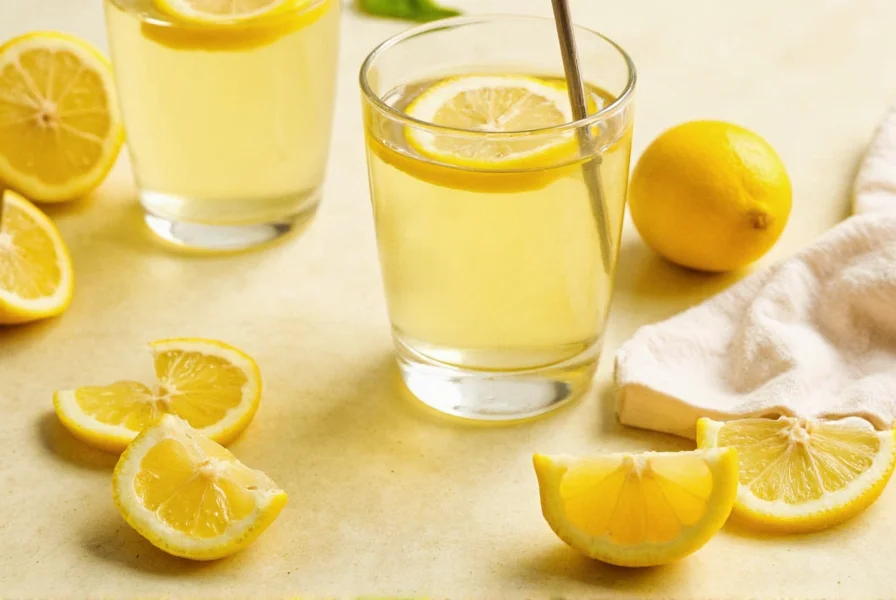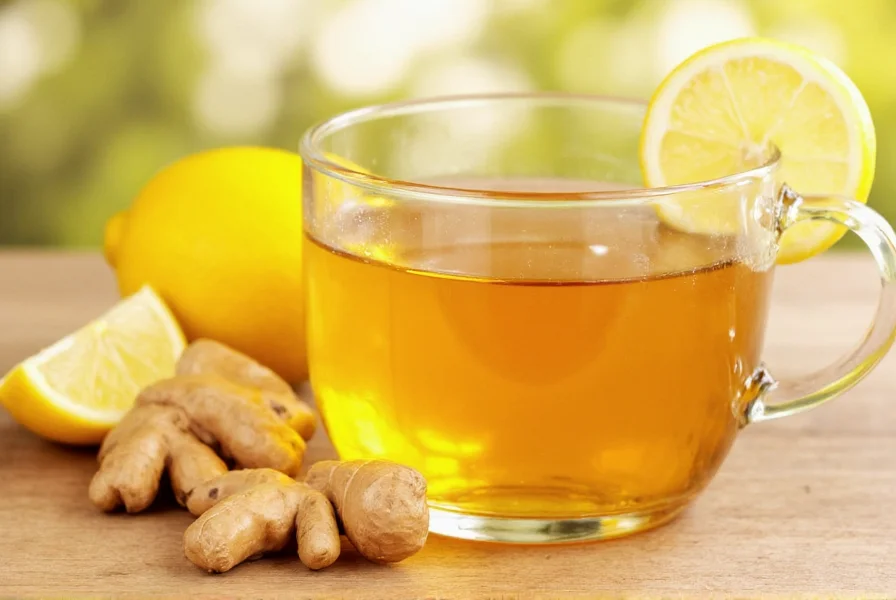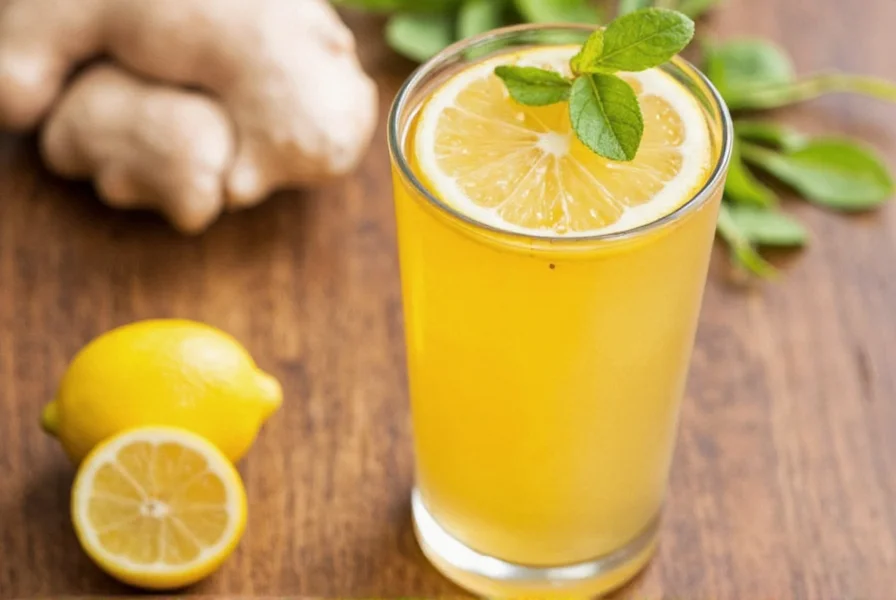Lemon ginger honey tea has become a popular natural remedy worldwide, valued for its refreshing taste and potential wellness benefits. This simple beverage combines three powerful natural ingredients that have been used in traditional medicine systems for centuries. Unlike commercial herbal teas that may contain additives, the homemade version allows you to control ingredient quality and proportions for maximum effectiveness.
The Science Behind Lemon Ginger Honey Tea
Each component of lemon ginger honey tea contributes unique bioactive compounds that work together to create a synergistic effect. Ginger contains gingerol, a potent anti-inflammatory compound that gives ginger its characteristic bite. Lemon provides vitamin C and flavonoids with antioxidant properties. Raw honey contains enzymes, antioxidants, and antimicrobial compounds that remain active when not exposed to high heat.
| Ingredient | Key Compounds | Primary Benefits |
|---|---|---|
| Ginger root | Gingerols, shogaols | Anti-inflammatory, nausea relief, digestive support |
| Lemon | Vitamin C, flavonoids | Antioxidant, immune support, hydration |
| Raw honey | Enzymes, phenolic acids | Antimicrobial, cough suppression, wound healing |
How to Make Lemon Ginger Honey Tea for Maximum Benefits
Preparing lemon ginger honey tea properly ensures you extract the maximum benefits from each ingredient. Start with fresh, organic ingredients when possible. For the ginger, use a 1-2 inch piece of fresh root, peeled and thinly sliced or grated. Simmer the ginger in 2 cups of filtered water for 10-15 minutes to extract the gingerols. Remove from heat before adding honey to preserve its beneficial enzymes and compounds, which degrade at high temperatures. Finally, squeeze in the juice of half a lemon.
Many people wonder how often to drink lemon ginger honey tea for optimal results. For general wellness, 1-2 cups daily is sufficient. When addressing specific concerns like a sore throat or digestive issues, you might safely consume up to 3 cups per day. However, those with certain medical conditions should consult their healthcare provider before making it a regular part of their routine.

When to Drink Lemon Ginger Honey Tea for Specific Benefits
Timing your consumption of lemon ginger honey tea can enhance its effectiveness for specific purposes. Understanding the best time to drink lemon ginger honey tea makes a difference in how your body utilizes its components:
- Morning consumption: Drinking lemon ginger honey tea first thing in the morning on an empty stomach may stimulate digestion, boost metabolism, and provide gentle hydration after sleep.
- Before meals: Consuming 15-20 minutes before eating can prepare your digestive system, potentially improving nutrient absorption and reducing bloating.
- Evening relaxation: A warm cup before bed may promote relaxation and support immune function during sleep, though those sensitive to citrus might want to consume it earlier in the evening.
- During illness: When experiencing cold symptoms, sipping lemon ginger honey tea throughout the day can soothe sore throats and provide hydration.
Evidence-Based Health Benefits of Lemon Ginger Honey Tea
While lemon ginger honey tea shouldn't replace medical treatment, research supports several potential health benefits:
Immune Support and Cold Relief
Many people seek information about lemon ginger honey tea for cold and flu symptoms. A 2013 study published in the Cochrane Database of Systematic Reviews found that honey provided superior relief for cough frequency and severity compared to placebo and even some over-the-counter medications. The combination of honey's antimicrobial properties with ginger's anti-inflammatory effects creates a soothing remedy for sore throats.
Digestive Health Benefits
Research shows ginger effectively reduces nausea and speeds gastric emptying. A study in the World Journal of Gastroenterology demonstrated that ginger increased stomach emptying rate by 25% in patients with functional dyspepsia. The citric acid in lemon may also support healthy digestion by stimulating bile production. This explains why many people experience lemon ginger honey tea benefits for digestion when consumed before or after meals.
Anti-Inflammatory Properties
Ginger's active compounds inhibit inflammatory pathways in the body. A review in Phytotherapy Research concluded that ginger supplementation significantly reduced markers of inflammation. When combined with lemon's antioxidants and honey's anti-inflammatory compounds, this tea creates a powerful natural anti-inflammatory beverage.
Potential Side Effects and Considerations
While generally safe for most people, lemon ginger honey tea has some considerations. Those with gastroesophageal reflux disease (GERD) might experience worsened symptoms from the citrus content. Ginger in large quantities may interact with blood-thinning medications. People with diabetes should monitor their honey intake, as even raw honey affects blood sugar levels.
Understanding lemon ginger honey tea side effects is crucial for safe consumption. Some individuals may experience heartburn, especially when consuming it on an empty stomach. Those with citrus allergies should avoid the lemon component. Pregnant women should consult their healthcare provider about appropriate ginger consumption levels, as excessive amounts might affect pregnancy.

Scientific Research on Lemon Ginger Honey Tea Components
While specific studies on the exact combination are limited, substantial research exists on each component:
- Ginger: A 2020 meta-analysis in Nutrients confirmed ginger's effectiveness for nausea relief, with significant results seen at doses of 1-1.5 grams daily.
- Lemon: Research in the Journal of Functional Foods identified lemon flavonoids as potent antioxidants that may help reduce oxidative stress.
- Honey: Multiple studies, including one in Pediatrics, have demonstrated honey's effectiveness as a cough suppressant, particularly in children over one year old.
When considering does lemon ginger honey tea help with sore throat, the evidence suggests it provides symptomatic relief through multiple mechanisms: honey coats the throat, ginger reduces inflammation, and lemon provides vitamin C to support immune function.
Creating Your Perfect Lemon Ginger Honey Tea Recipe
The ideal lemon ginger honey tea recipe for immunity balances all three ingredients for maximum benefit without overwhelming any single flavor:
- Peel and thinly slice 1-2 inches of fresh ginger root
- Simmer in 2 cups of filtered water for 10-15 minutes
- Remove from heat and let cool for 2-3 minutes
- Add juice of half a lemon
- Stir in 1-2 teaspoons of raw, unprocessed honey
- Optional: Add a cinnamon stick or pinch of turmeric for additional benefits
For those specifically seeking how to make lemon ginger honey tea for cold symptoms, consider increasing the ginger content slightly and adding a pinch of cayenne pepper to help clear nasal passages.
Conclusion: Integrating Lemon Ginger Honey Tea Into Your Wellness Routine
Lemon ginger honey tea offers a simple, natural way to support overall wellness when prepared correctly and consumed appropriately. While not a cure-all, its combination of anti-inflammatory, antioxidant, and antimicrobial properties makes it a valuable addition to a healthy lifestyle. Remember that individual responses may vary, and this tea works best as part of a comprehensive approach to health that includes proper nutrition, exercise, and medical care when needed.
Does lemon ginger honey tea really help with sore throats?
Yes, lemon ginger honey tea can provide significant relief for sore throats. Honey coats the throat to reduce irritation, ginger has anti-inflammatory properties that decrease swelling, and lemon's vitamin C supports immune function. A 2012 study in Pediatrics found honey more effective than placebo for reducing cough frequency and severity, which often accompanies sore throats.
How often should I drink lemon ginger honey tea for maximum benefits?
For general wellness, 1-2 cups daily is sufficient. When addressing specific concerns like a cold or digestive issues, you might safely consume up to 3 cups per day. However, those with certain medical conditions or taking medications should consult their healthcare provider before making it a regular part of their routine. It's best to space consumption throughout the day rather than drinking multiple cups at once.
Can I make lemon ginger honey tea with store-bought ginger powder instead of fresh ginger?
Yes, you can substitute fresh ginger with ginger powder, though fresh ginger generally provides more potent benefits. Use 1/4 to 1/2 teaspoon of ginger powder per cup of water as a substitute for 1 inch of fresh ginger. Keep in mind that powdered ginger may have slightly different bioactive compound concentrations than fresh ginger, so the effects might vary slightly.
Is it safe to give lemon ginger honey tea to children?
Lemon ginger honey tea can be given to children over 1 year old, but with important considerations. Honey should never be given to infants under 1 year due to botulism risk. For children 1-2 years, use only 1/4 teaspoon of honey. Children 2-5 years can have 1/2 teaspoon, and older children can have up to 1 teaspoon. Always consult with a pediatrician before giving this tea to young children, especially if they're ill or taking medications.
When is the best time to drink lemon ginger honey tea for digestion?
The optimal time to drink lemon ginger honey tea for digestive benefits is 15-20 minutes before meals. This timing allows the ginger to stimulate digestive enzymes and prepare your stomach for food, potentially improving nutrient absorption and reducing bloating. Some people also find benefit from drinking it after meals, particularly if experiencing indigestion. For general digestive maintenance, one cup in the morning on an empty stomach can help kickstart your digestive system.











 浙公网安备
33010002000092号
浙公网安备
33010002000092号 浙B2-20120091-4
浙B2-20120091-4